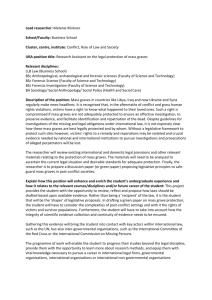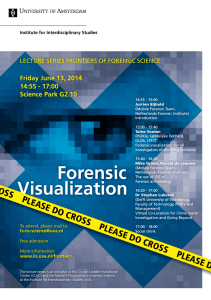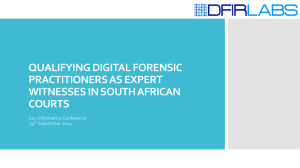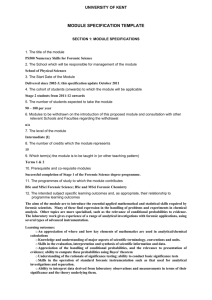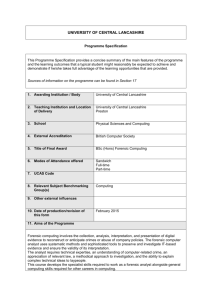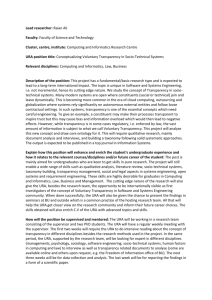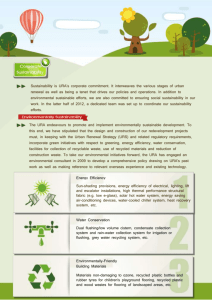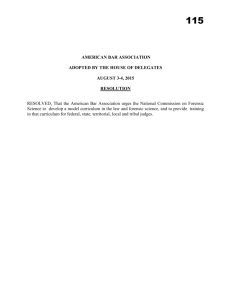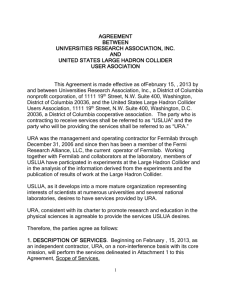Legal protection of mass graves project
advertisement
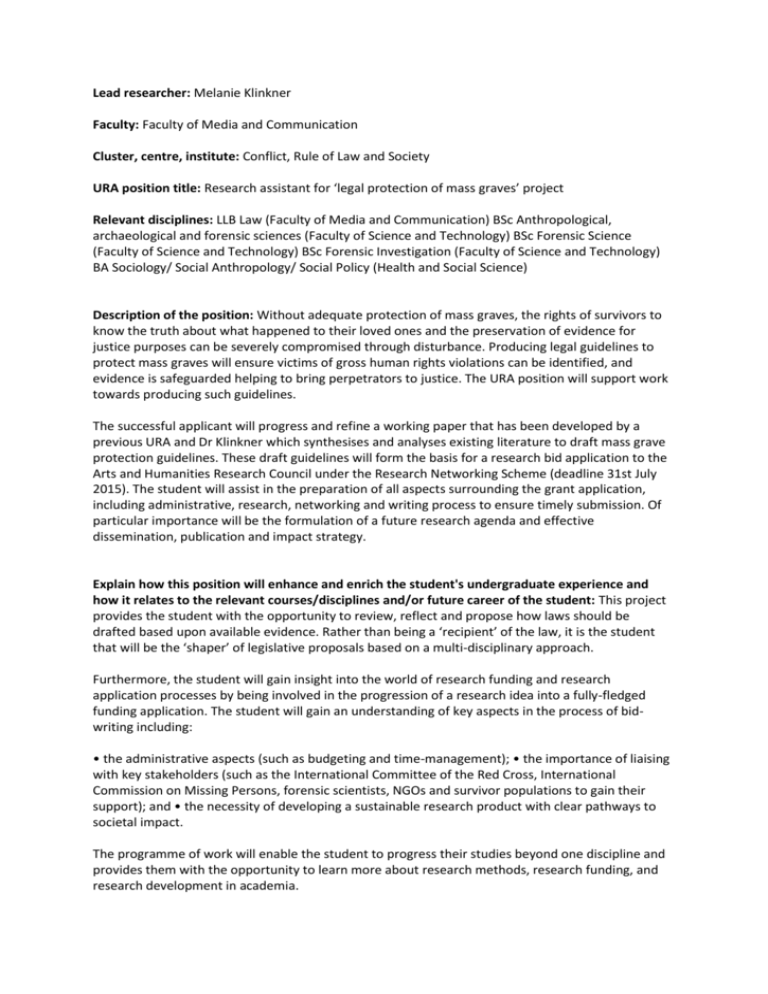
Lead researcher: Melanie Klinkner Faculty: Faculty of Media and Communication Cluster, centre, institute: Conflict, Rule of Law and Society URA position title: Research assistant for ‘legal protection of mass graves’ project Relevant disciplines: LLB Law (Faculty of Media and Communication) BSc Anthropological, archaeological and forensic sciences (Faculty of Science and Technology) BSc Forensic Science (Faculty of Science and Technology) BSc Forensic Investigation (Faculty of Science and Technology) BA Sociology/ Social Anthropology/ Social Policy (Health and Social Science) Description of the position: Without adequate protection of mass graves, the rights of survivors to know the truth about what happened to their loved ones and the preservation of evidence for justice purposes can be severely compromised through disturbance. Producing legal guidelines to protect mass graves will ensure victims of gross human rights violations can be identified, and evidence is safeguarded helping to bring perpetrators to justice. The URA position will support work towards producing such guidelines. The successful applicant will progress and refine a working paper that has been developed by a previous URA and Dr Klinkner which synthesises and analyses existing literature to draft mass grave protection guidelines. These draft guidelines will form the basis for a research bid application to the Arts and Humanities Research Council under the Research Networking Scheme (deadline 31st July 2015). The student will assist in the preparation of all aspects surrounding the grant application, including administrative, research, networking and writing process to ensure timely submission. Of particular importance will be the formulation of a future research agenda and effective dissemination, publication and impact strategy. Explain how this position will enhance and enrich the student's undergraduate experience and how it relates to the relevant courses/disciplines and/or future career of the student: This project provides the student with the opportunity to review, reflect and propose how laws should be drafted based upon available evidence. Rather than being a ‘recipient’ of the law, it is the student that will be the ‘shaper’ of legislative proposals based on a multi-disciplinary approach. Furthermore, the student will gain insight into the world of research funding and research application processes by being involved in the progression of a research idea into a fully-fledged funding application. The student will gain an understanding of key aspects in the process of bidwriting including: • the administrative aspects (such as budgeting and time-management); • the importance of liaising with key stakeholders (such as the International Committee of the Red Cross, International Commission on Missing Persons, forensic scientists, NGOs and survivor populations to gain their support); and • the necessity of developing a sustainable research product with clear pathways to societal impact. The programme of work will enable the student to progress their studies beyond one discipline and provides them with the opportunity to learn more about research methods, research funding, and research development in academia. How will the position be supervised and mentored: The programme of work will be supervised by Dr. Melanie Klinkner, who has researched in the field of mass grave evidence collection and its use for international criminal purposes. A two level approach is envisaged consisting, firstly, of mentoring and co-creation for the research process itself and secondly, guidance and co-operation through the funding application process. (1) Much of the literature on the subject has already been sourced, analysed and synthesised but now needs refining. Supervision will ensure that the student is guided through the existing work so that it can be progressed, in collaboration with Dr Klinkner, into draft guidelines which in turn will form the basis for the grant application. (2) Regular meetings will be held to progress the research bid itself with its administrative, networking and writing requirements. The methodology of the bid involves participation of stakeholders from the military, forensic sciences, criminal investigations, legal profession, NGOs, and survivor group to take part in discussions refining the draft paper. Getting various stakeholder onboard will be part of the tasks and will be closely managed by the supervisor. There will also be collaboration with Dr Schwandner-Sievers (HSS) who will be Co-Investigator on the final bid. List of duties and responsibilities of the position: • Analysis of the interdisciplinary materials; • Legal writing and structuring ; • Networking; • Administration associated with the funding application; • Grant application drafting; • Developing a research agenda; • Formulating a publication and impact strategy. List the position qualifications including any special requirements (be specific): The applicant should possess: an understanding of international law; an interest in post-conflict solutions, intervention and transitional justice; an interest in research funding; strong written communication skills; an aptitude for networking; and a desire to work across disciplines. To ensure the student is integrated into the University's research environment and activities, it is suggested that a desk-space (including PC and telephone) within a PhD student office is offered to the successful candidate. At a time where the university tends to be empty of undergraduate students this will also offer the possibility of socialising at the work place.
